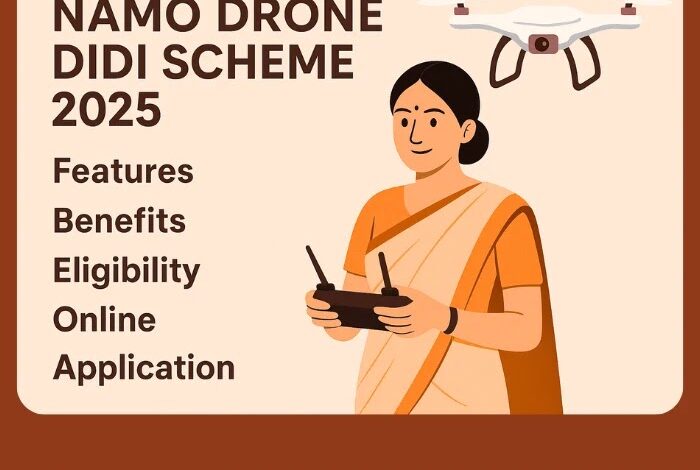Govt Schemes 2025, PM Yojana, Scholarships, Essays and News

Namo Drone Didi Scheme 2025: The Namo Drone Didi Scheme, launched by the Government of India, is a transformative initiative aimed at empowering rural women by integrating advanced drone technology into agriculture. Also referred to as the Lakhpati Didi Scheme, this central sector program is designed to uplift women in Self-Help Groups (SHGs) under the Deendayal Antyodaya Yojana – National Rural Livelihood Mission (DAY-NRLM) by equipping them with drones for agricultural services. Launched on November 30, 2023, by Prime Minister Narendra Modi through a video conference, the scheme is set to run from 2023-24 to 2025-26 with a budget of INR 1,261 crores. This article provides a comprehensive overview of the scheme’s features, benefits, eligibility criteria, and the online application process, highlighting its potential to revolutionize agriculture and empower rural women.
{tocify} $title={Table of Contents}
What is Namo Drone Didi Scheme 2025
The Namo Drone Didi Scheme 2025, also known as the Lakhpati Didi Scheme, is a transformative initiative by the Government of India aimed at empowering rural women through the integration of drone technology in agriculture. Launched on November 30, 2023, by Prime Minister Narendra Modi, this central sector scheme, running from 2023-24 to 2025-26 with a budget of INR 1,261 crores, targets 15,000 women Self-Help Groups (SHGs) under the Deendayal Antyodaya Yojana – National Rural Livelihood Mission (DAY-NRLM). It provides drones with an 80% subsidy (up to INR 8 lakh per SHG) and low-interest loans for the remaining cost, enabling women to offer rental services for tasks like spraying fertilizers, pesticides, and crop monitoring.
 |
| Namo Drone Didi Scheme |
The scheme includes a 15-day training program, covering drone operation, maintenance, and agricultural applications, fostering skills and entrepreneurship. By promoting precision farming, it enhances agricultural efficiency, reduces costs, and supports sustainable practices, while empowering women with an additional income of approximately INR 1 lakh annually. Eligible SHGs must be registered under DAY-NRLM, with members aged 18–50 (or up to 65 in some cases) and a minimum Class 10 education. The scheme, supported by multiple ministries and monitored through an IT-based system, is a significant step toward gender equality, rural development, and technological advancement in Indian agriculture.
Namo Drone Didi Scheme Highlights
| Scheme Name | Namo Drone Didi Scheme |
|---|---|
| Launch Date | November 30, 2023 |
| Duration | 2023–24 to 2025–26 |
| Budget | INR 1,261 crores |
| Objective | Empower rural women SHGs with drone technology for agricultural services, promoting economic independence and precision farming. |
| Target Beneficiaries | 14,500–15,000 women Self-Help Groups (SHGs) under DAY-NRLM |
| Financial Support | 80% subsidy (up to INR 8 lakh/SHG) on drones; 20% via 3% interest loans from AIF. |
| Training | 15 days total: 5 days drone pilot training + 10 days on agricultural use, maintenance, and data analysis. |
| Eligibility | Registered women SHGs under DAY-NRLM; members aged 18–50 (up to 65); Class 10 pass; physically and mentally fit. |
| Key Activities | Precision spraying, crop monitoring, soil surveys, irrigation management. |
| Category | Central Govt Scheme |
| Application Process | Apply via Namo Drone Didi Portal or DAY-NRLM site. |
Background and Objectives
The Namo Drone Didi Scheme is a visionary step toward bridging the gender gap in technology adoption and fostering economic independence among rural women. The primary objective is to empower women in SHGs by providing them access to drone technology, enabling them to offer rental services to farmers for tasks like spraying liquid fertilizers, pesticides, and crop monitoring. By integrating modern technology into agriculture, the scheme aims to enhance productivity, reduce operational costs, and improve crop yields while creating sustainable livelihood opportunities for women.
Empowering rural women & transforming agriculture with the Namo Drone Didi Scheme!
Through advanced drone technology, this initiative provides women-led Self-Help Groups with the tools and training to support farmers and boost productivity.#SelfReliance #NamoDroneDidi pic.twitter.com/dE8tak4s7k
— Ministry of Information and Broadcasting (@MIB_India) November 5, 2024
The initiative aligns with the broader vision of fostering economic empowerment and financial autonomy among rural women, as emphasized by Prime Minister Modi during his interactions with beneficiaries of the Viksit Bharat Sankalp Yatra. It also supports the government’s push for technological advancement in agriculture under the Atmanirbhar Bharat initiative, ensuring that rural women become integral stakeholders in India’s agri-tech revolution. The scheme is expected to benefit 14,500 to 15,000 women SHGs across India, enabling them to earn an additional income of approximately INR 1 lakh per year by providing drone-based services.
Cashless Treatment Scheme For Road Accident Victims
Key Features of the Namo Drone Didi Scheme
The Namo Drone Didi Scheme is structured to provide comprehensive support to women SHGs, combining financial assistance, skill development, and technological resources. Below are the standout features of the scheme:
Drone Allocation: The scheme aims to distribute drones to 15,000 selected women SHGs across India from 2024-25 to 2025-26. These drones are equipped with accessories such as spray assemblies, batteries, cameras, chargers, and measurement tools for agricultural applications.
Financial Support: The government provides a subsidy of 80% on the cost of drones and accessories, up to a maximum of INR 8 lakh per SHG. The remaining 20% can be covered through loans from the National Agriculture Infrastructure Financing Facility (AIF) at a nominal interest rate of 3% per annum.
Training and Skill Development: Each selected SHG nominates one member to undergo a 15-day training program, which includes 5 days of mandatory drone pilot training and 10 days of additional training focused on agricultural applications, such as nutrient and pesticide spraying. The training also covers drone repair, maintenance, and data analysis, ensuring women are well-equipped to operate and manage drones.
Implementation Partners: The scheme is a collaborative effort involving multiple stakeholders, including the Ministry of Agriculture and Farmers Welfare, Department of Rural Development, Department of Fertilizers, Ministry of Civil Aviation, Ministry of Women and Child Development, Krishi Vigyan Kendras (KVKs), Custom Hiring Centres, and Lead Fertilizer Companies (LFCs). These partners provide technical support, training, and monitoring.
IT-Based Monitoring: An IT-based Management Information System (MIS) serves as a comprehensive platform for service delivery, monitoring, and stakeholder coordination, ensuring transparency and efficiency in implementation.
Community and Networking Opportunities: The scheme fosters a supportive network for participants through forums, workshops, and a National Conference on Women in AgTech, where women can share experiences, learn best practices, and connect with industry experts and mentors.
Focus on Precision Agriculture: Drones are used for tasks such as crop monitoring, soil and field analysis, precision spraying of fertilizers and pesticides, and irrigation management. This enhances efficiency, reduces manual labor, and promotes sustainable farming practices.
Pradhanmantri Dhan Dhanya Krishi Yojana
Benefits of the Namo Drone Didi Scheme
The Namo Drone Didi Scheme offers multifaceted benefits, impacting women, farmers, and rural communities. Here’s a detailed look at its advantages:
Economic Empowerment
- Additional Income: Women SHGs can earn an estimated INR 1 lakh annually by offering drone-based rental services to farmers. Some sources suggest a monthly income of INR 15,000 or more, depending on demand.
- Financial Independence: By providing access to advanced technology and business opportunities, the scheme enables women to become self-reliant and contribute to their household income.
Technological Advancement in Agriculture
- Precision Farming: Drones ensure accurate application of fertilizers and pesticides, reducing wastage and improving crop yields.
- Efficiency and Cost Reduction: Drone-based spraying is faster and more efficient than manual methods, lowering operational costs for farmers.
- Soil and Irrigation Management: Drones enable detailed soil surveys, fertility assessments, and efficient irrigation by identifying areas needing more or less water.
Skill Development
- Technical Expertise: Women gain advanced skills in drone operation, maintenance, and data analysis, making them employable in emerging sectors like agri-tech, e-commerce, and disaster management.
- Entrepreneurship Opportunities: Trained women can start drone-based agribusinesses, fostering a new generation of rural women entrepreneurs.
Rural Development
- Bridging the Urban-Rural Divide: By introducing advanced technology to rural areas, the scheme reduces the technological gap and promotes economic growth in villages.
- Community Upliftment: The additional income and skills acquired by women SHGs contribute to the socio-economic development of rural communities.
Women’s Empowerment
- Breaking Stereotypes: The scheme challenges gender norms by placing women at the forefront of technological innovation in agriculture, traditionally a male-dominated field.
- Leadership and Networking: Women gain access to mentorship, industry experts, and a supportive community, enhancing their leadership skills and professional growth.
Environmental Benefits
- Sustainable Practices: Precision application of agrochemicals minimizes environmental impact by reducing overuse and runoff.
- Efficient Resource Use: Drones optimize water and fertilizer usage, promoting sustainable farming practices.
Eligibility Criteria of Scheme
To participate in the Namo Drone Didi Scheme, women SHGs must meet specific eligibility criteria:
- SHG Membership: Only registered women Self-Help Groups under DAY-NRLM are eligible. Individual women must be members of these SHGs.
- Age Requirement: Participants selected for training must be between 18 and 50 years (some sources extend the upper limit to 65 years).
- Educational Qualification: A minimum of Class 10 pass is required to understand training modules and operate drone technology.
- Physical and Mental Fitness: Participants must be physically and mentally fit to undergo training and operate drones.
- Cluster-Based Selection: SHGs are selected based on agricultural demand in their area, with each group expected to manage 2,000–2,500 acres annually.
- Financial Status and Community Contribution: District Committees prioritize SHGs based on their financial status and contributions to society.
Additionally, SHG members or their family members (e.g., son, husband, or daughter) with an inclination for repairs or technical work may be trained as Drone Assistants.
Online Application Process
The application process for the Namo Drone Didi Scheme is designed to be straightforward and accessible. However, as of the latest updates, the official application process is yet to be fully rolled out. Below is a general guide based on available information:
- Visit the Official Portal: Applicants should visit the Namo Drone Didi Portal or the DAY-NRLM/Ministry of Rural Development website for scheme details and application forms.
- Register or Log In: Create an account using SHG credentials or log in if already registered.
- Fill the Application Form: Provide accurate details, including SHG registration number, member details, and location.
Upload required documents, such as:
- SHG Registration Number
- Aadhaar Cards of women members
- SHG Bank Account Details
- Mobile Number
- Submit and Review: Review the application for accuracy and submit it. Await confirmation from authorities, such as the District Rural Development Authority (DRDA) or Cluster Level Federation (CLF).
- Contact Local Authorities: For further guidance, SHGs can contact their nearest Pradhanmantri Kisan Samriddhi Kendra or Gram Panchayat Office.
Once selected, SHGs are notified by the District Committee, and training is arranged before drones are provided.
Implementation and Monitoring
The scheme is governed centrally by an Empowered Committee comprising secretaries from the Department of Agriculture and Farmers Welfare, Department of Rural Development, Department of Fertilizers, Ministry of Civil Aviation, and Ministry of Women and Child Development. An Implementation and Monitoring Committee, headed by the Additional Secretary of the Department of Rural Development, ensures effective planning and execution. States play a crucial role in monitoring interventions, selecting SHGs, and providing handholding support to manage the targeted 2,000–2,500 acres annually.
Impact and Recognition
The Namo Drone Didi Scheme has garnered national and global attention for its innovative approach. Prime Minister Modi has praised the women participants as “Sky Warriors” in his Mann Ki Baat address, highlighting their role in revolutionizing agriculture. Microsoft founder Bill Gates also commended the program for empowering rural women and enhancing agricultural productivity, sharing its success stories on social media. States like Haryana have led the way, training 5,000 women from 500 SHGs to deliver modern agricultural services.
Challenges and Future Scope
While the scheme holds immense potential, challenges such as limited technological awareness in rural areas, infrastructure constraints, and the need for continuous training may arise. Addressing these through robust support systems, such as ongoing maintenance sessions and advanced training modules, will be critical. The scheme’s future scope includes expanding its reach to more SHGs, integrating additional applications like disaster management, and fostering women-led agribusinesses.
Conclusion
The Namo Drone Didi Scheme 2025 is a groundbreaking initiative that combines women’s empowerment with technological innovation in agriculture. By providing drones, subsidies, and training to women SHGs, the scheme not only enhances farming efficiency but also creates sustainable livelihoods for rural women. With its focus on skill development, financial support, and community building, it paves the way for a new era of gender equality and rural development. Women interested in participating should stay updated through official portals and local authorities to seize this opportunity to become “Drone Didis” and lead India’s agri-tech revolution.
FAQs: Namo Drone Didi Scheme 2025
Q. What is the Namo Drone Didi Scheme 2025?
A central scheme to empower rural women SHGs under DAY-NRLM with drones for agricultural services like spraying fertilizers, pesticides, and crop monitoring, launched in 2023.
Q. What is its objective?
To empower rural women with drone technology, boost agricultural productivity, promote sustainable farming, and provide income of ~INR 1 lakh/year.
Q. Who is eligible?
Registered women SHGs under DAY-NRLM, members aged 18–50 (or up to 65), Class 10 pass, physically/mentally fit, selected based on agricultural demand and community contribution.
Q. What financial support is provided?
80% subsidy on drones (up to INR 8 lakh/SHG), 20% via 3% interest loans from National Agriculture Infrastructure Financing Facility.
Q. What training is provided?
15-day training: 5 days for drone pilot license, 10 days for agricultural applications, maintenance, and data analysis.
Q. How many SHGs will benefit?
14,500–15,000 women SHGs across India from 2023-24 to 2025-26.
Q. What are the benefits?
Women: INR 1 lakh/year income, tech skills, entrepreneurship. Farmers: Precision farming, cost reduction, better yields. Communities: Rural development, sustainability.
Q. How to apply?
Visit Namo Drone Didi Portal or DAY-NRLM site, register, fill form with SHG details, upload Aadhaar, bank details, submit, and await DRDA/CLF confirmation.
Q. What tasks can drones perform?
Spraying fertilizers/pesticides, crop monitoring, soil surveys, and irrigation management.
Q. Can individual women apply?
No, only registered women SHGs under DAY-NRLM can apply, not individual women.





